Here are my favorite poems about rabbits categorized:
- Short poems about rabbits
- Simple poems about rabbits
- Funny poems about rabbits
- Poems about rabbits with rhyme
- Poems for a rabbit that died
So if you want the best poems about rabbits, then you’re in the right place.
Let’s get right into it!
- 21 Elating Poems About Swallows
- 39 Untamed Poems About Lions
- 37 Unflinching Poems About Wolves
- 21 Heart-Fluttering Poems About Butterflies
- 53 Free-Spirited Poems About Horses
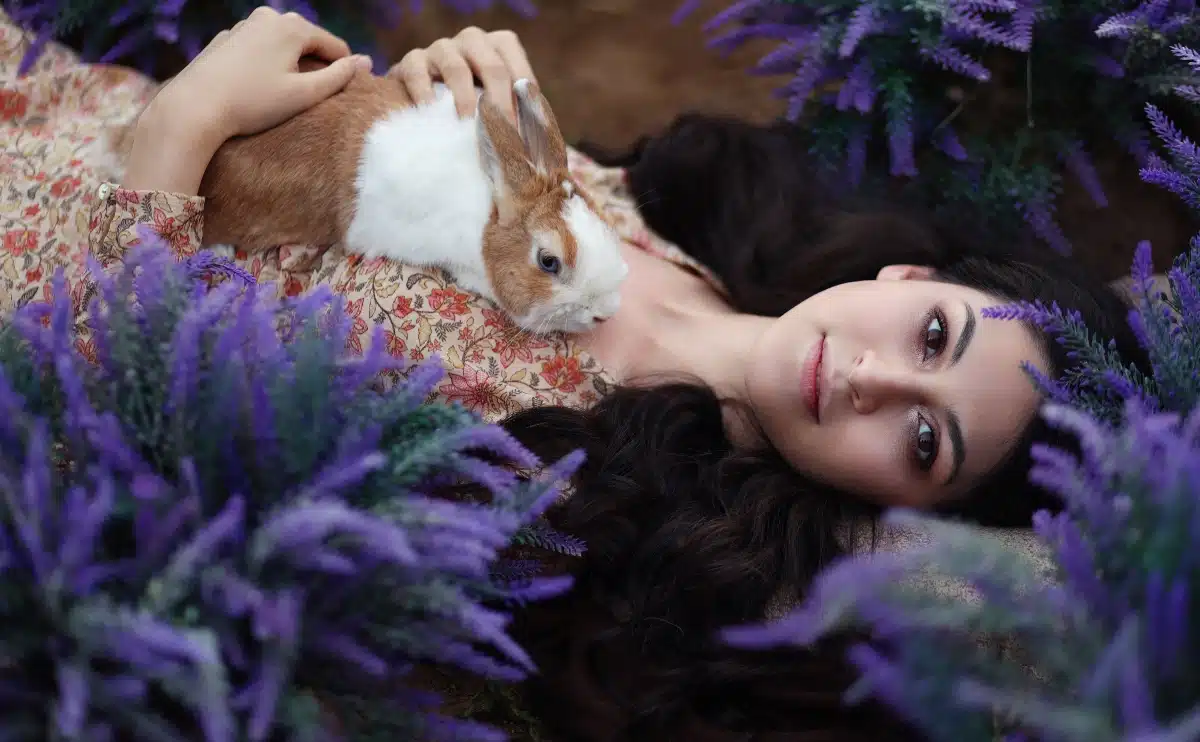
Gleeful Poems About Rabbits

Hop into our whimsical world of rabbit-inspired poetry, attentively compiled in one place for your reading pleasure.
From short creations packed with playful antics and witty wordplay to bittersweet poems with deeper symbolism and emotions associated with a rabbit’s fateful end.
So, whether you seek lighthearted enjoyment or a thought-provoking experience, our rabbit-themed anthology has it all.
Join us as we celebrate the charm, symbolism, and diverse range of emotions that rabbits inspire in poets throughout the ages.
Ready to go down the rabbit hole?
Let’s jump right in!
My #1 Favorite Poem About Rabbits
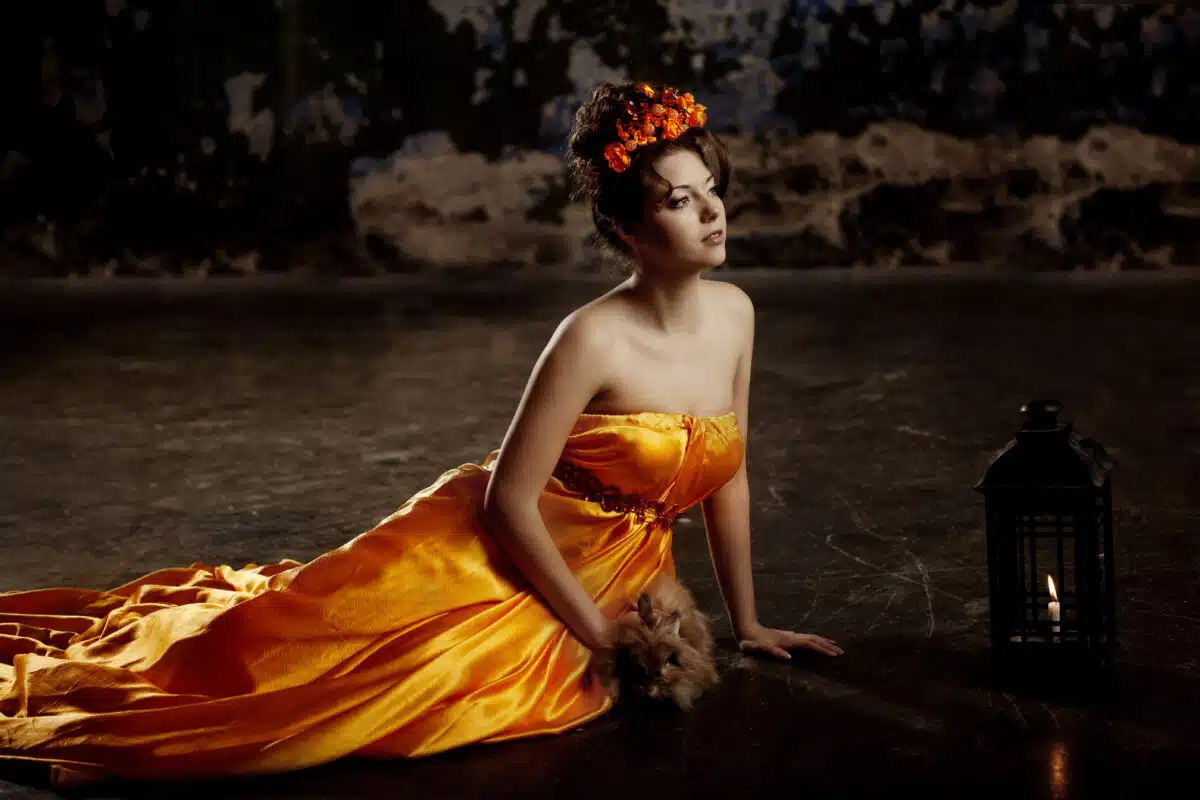
“Adventures (Ballad of the Lost Hare)” by Margaret Sidney
Little Bossy Whitefoot
Grazing in a field,
Eating all the green grass,
Such a tender yield;
Dreaming of the days,
When she would be a cow,
How she wished that very time
Would come just now.
She shook her frisky feet,
And wrinkled up her nose,
And tossed her pretty head,
Then trotted on her toes.
When—looking down, she saw
Two frightened eyes,
And there the Hare and Bossy stood
In mutual surprise!
“I’m sorry I have scared you,”
Said this Hare considerate,
“Good bye, I must be going,
For it is very late.”
He turned him on his long legs,
He scuttled thro’ the glade,
He held his head as if, forsooth,
He never were afraid!
The next he knew, with accent bold,
A dread voice cried—”Intruder—Hold!”
“I’ll butt you,” cried a Goat,
“If you don’t get off my rock.”
The Hare could scarcely breathe,
So frightful was the shock.
He gasped; he tried to utter
A word with meaning fraught,
But to save his neck he couldn’t
Control a single thought.
The Goat was tired of waiting,
He started for the Hare,
Only to find a vacant place,
Only to stand and stare.
For a flash of flying feet,
A glimpse of a gleaming eye,
Was all that marked this Hero,
Who’d rather run than die.
And now a neigh and a snort tremendous,
Aroused an echo most stupendous!
A Mustang gay,
A Mustang free,
Looked at the little Hare
Carelessly.
Looked—then curvetted,
Inviting to play,
But the Hare almost trembled,
Its life away.
“No—No—No!” he cried,
In wild protesting,
“I haven’t come for play,
Nor any jesting.”
“Ha—Ha!” laughed the Mustang,
And then “Hey? Hey?”
And kicking up his heels,
He began to neigh.
The Hare stole off,
In fact, he ran
As he hadn’t run before
From beast or man.
He tucked under fences,
He skipped around trees,
He didn’t pause to take a look,
Or even stop to sneeze.
When a horrible bellow,
A wheeze and a snort
Came close to his ears
With loudest report
And a Bull most furious,
With rage not spurious,
Dashed up with a curious
Bow and a stare.
Little Hare panting—
Angry Bull ranting—
Ah—what a race!
Oh, and he’ll catch him,
Then he’ll despatch him,
Pitiful chase!
‘Twas a hair-breadth escape—I tell you true!
I’d have given a dime to have been there in time
To see them sweep by—those two!
Three little Lambs
Playing in clover
Called to the frightened Hare
Over and over.
“Come with us—into this
Pretty, pretty spot?”
Gasped he flying past,
“I’d—rather—not!”
“Rather not, indeed!”
Each Lamb rubbed his eye,
Then stared in calm disdain,
To see him onward fly.
“He may”—then all exclaimed
In accents terse,
“Go further if he cares,
And fare much worse.”
Whish—whirr! on his track
Fast at his heels comes a flying pack!
Baying, snapping,
Howling, yelling!
Can he get away?
There is no telling!
Fly little swift feet over dale and hill,
Take him dashing, flashing by the mill;
Tips of his toes, twinkle, twinkle fast,
Don’t let the dogs eat him up at last!
Don’t let the hungry, cruel, cruel jaws
Snap off his pretty little velvet paws,
Tear off his ears in terrible sport—
Don’t let the naughty little thing be caught!
Ah!
A hole—a hole!
In he goes!
The dogs tumble up
To stare at his toes.
They gnash their jaws,
And bewail their fate;
But to eat little Hare
Must wait—must wait!
Short Poems About Rabbits
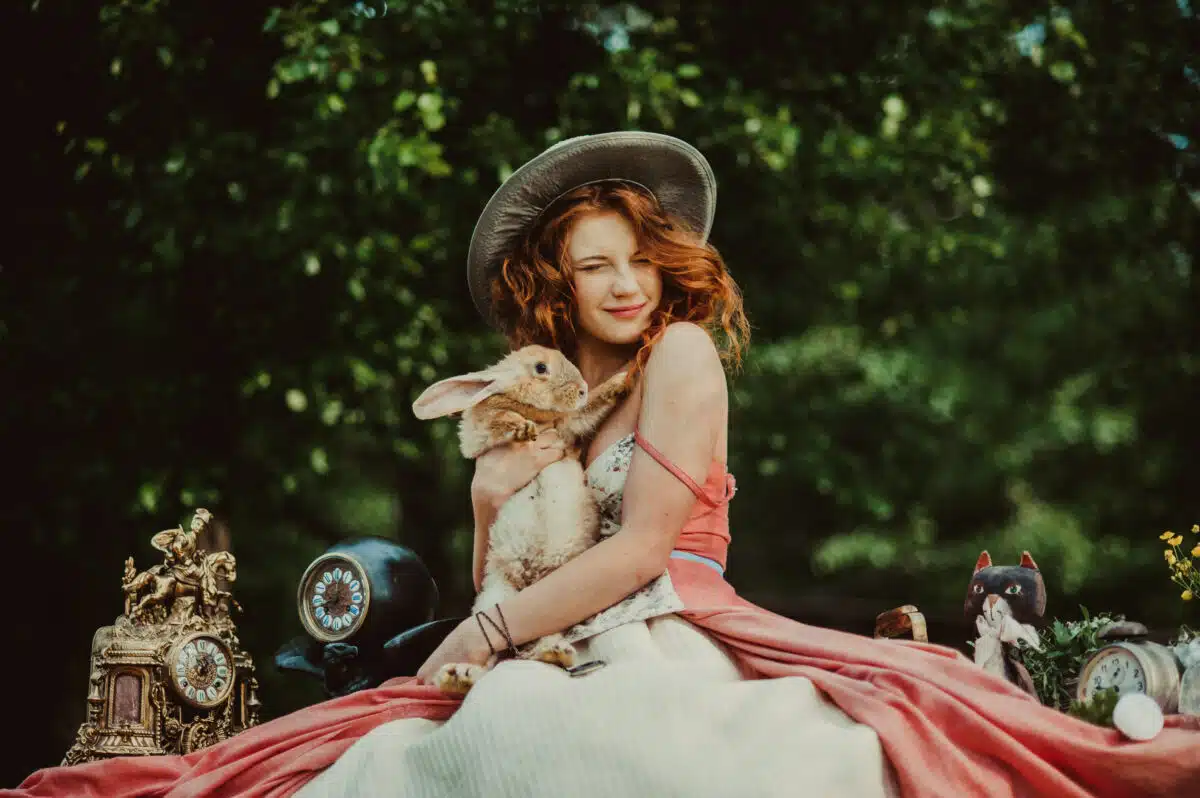
“Rabbit” by Edith Brown Kirkwood
To market, to market, with baskets of eggs,
Jack Rabbit goes hurrying on his long legs;
He’ll buy him some colors—red, green, yellow, blue,
And when Easter comes ’round you know what he’ll do.
“The Hare and the Tortoise” by Aesop (Walter Crane, Translator)
‘Twas a race between Tortoise and Hare,
Puss was sure she’d so much time to spare,
That she lay down to sleep,
And let old Thick-shell creep
To the winning post first!–You may stare.
“The Hares and the Frogs ” by Aesop (Walter Crane, Translator)
Timid Hares, from the trumpeting wind,
Fled as swift as the fear in their mind;
Till in fright from their fear,
From the green sedges near,
Leaping Frogs left their terror behind.
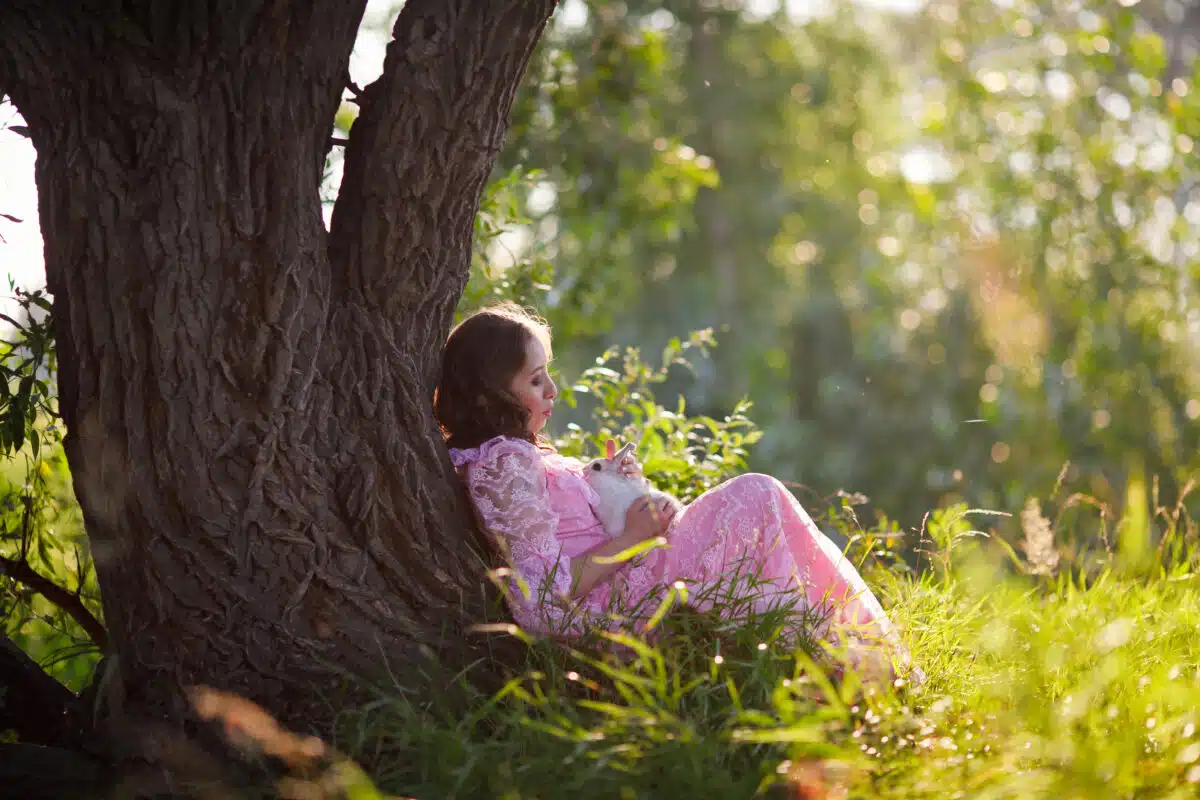
“The Pet Rabbit.” by Lizzie Lawson
“I have a little Bunny with a coat as soft as down,
And nearly all of him is white except one bit of brown.
The first thing in the morning when I get out of bed,
I wonder if my Bunny’s still safe in his little shed.
And than the next thing that I do I dare say you have guessed;
It’s to go at once and see him, when I am washed and dressed.
And every day I see him I like him more and more,
And each day he is bigger than he was the day before.
I feed him in the morning with bran and bits of bread,
And every night I take some straw to make his little bed.
What with carrots in the morning and turnip-tops for tea,
If a bunny can be happy, I’m sure he ought to be.
Then when it’s nearly bedtime I go down to his shed,
And say ‘Good night you Bunny’ before I go to bed.
I think there’s only one thing that would make me happy quite,
If I could take my Bunny dear with me to bed at night?”
“The Snare” by James Stephens
I hear a sudden cry of pain!
There is a rabbit in a snare:
Now I hear the cry again,
But I cannot tell from where.
But I cannot tell from where
He is calling out for aid;
Crying on the frightened air,
Making everything afraid.
Making everything afraid,
Wrinkling up his little face,
As he cries again for aid;
And I cannot find the place!
And I cannot find the place
Where his paw is in the snare:
Little one! Oh, little one!
I am searching everywhere.
“Hare-bells” by John.Tabb
Ring! The little Rabbits’ eyes,
In the morning clear,
Moisten to the melodies
They alone can hear.
Ring! The little Rabbits’ feet,
Shod with racing rhyme,
If the breezes they would beat,
Must be beating time.
Ring! When summer days are o’er,
And the snowfalls come,
Rabbits count the hours no more,
For the bells are dumb.
Simple Poems About Rabbits
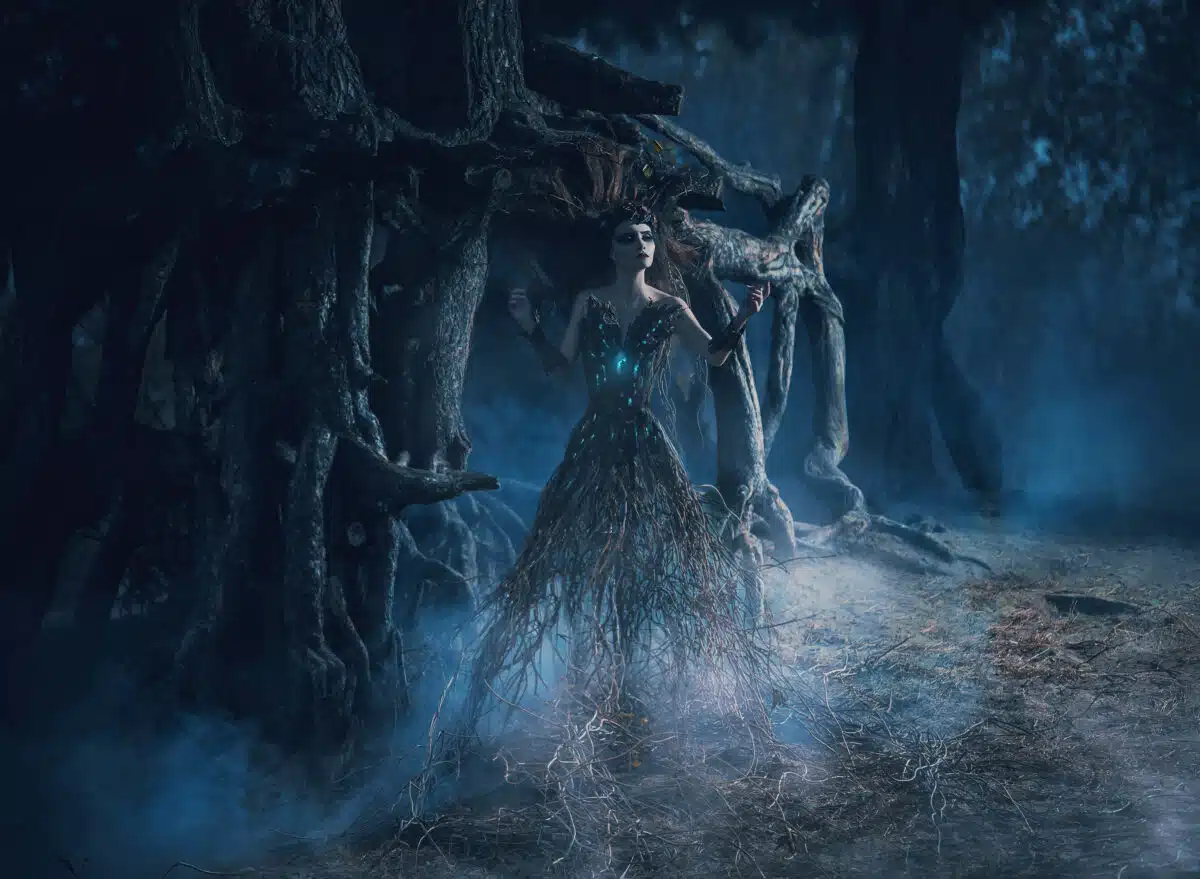
“Night Fall in the Ti-Tree” by Geraldine Rede and Violet Teague
Night falls in the Ti-Tree,
Dusk fades from the hill—
The Frogs on their banjoes
Are strumming their fill
With a will.
Banjoes in the near pond
Bones in the other—
In ecstasy Crickets
Outshrill one another.
Shrill…. Shrill….
The Birds are all hushed now
The moon’s in the sky—
Around and around us
The little Bats fly,
Waveringly.
The Rabbits have nibbled
Sweet grass on the furrow,
Have frisking and flirting
Loped to their burrow,
Safe on their burrow.
Safe on their burrow.
Are you glad, little Rabbits
To have played yet a day?
Does no foresight show you
What may happen some day?
Wellaway!
For commonest, direst,
Of wild folk’s mishaps
Is to find yourselves caught in
Man’s merciless traps—
Devil’s own snaps.
They set them and lay them
In your very door,
Then craftily strew them
With sand and leaves o’er,
Craftily o’er.
You step out unwitting,
Bright moon inviting—
Ah! What a spring when
You taste its fierce biting;
Steel chain affrighting,
You scream in your anguish,
A mute thing by kind!
You make but the search easy
When Death comes to find,
O easily find!
Yet God was on your side,
Else why did He make
Such long ears to hearken?
Such bright eyes to wake?
And so, little Rabbits,
In danger some day,
Remember Who’s for you,
Flirt tails and away!
“The Cat, the Weasel, and the Young Rabbit.” by Jean de La Fontaine
John Rabbit’s palace under ground
Was once by Goody Weasel found.
She, sly of heart, resolved to seize
The place, and did so at her ease.
She took possession while its lord
Was absent on the dewy sward,
Intent upon his usual sport,
A courtier at Aurora’s court.
When he had browsed his fill of clover
And cut his pranks all nicely over,
Home Johnny came to take his drowse,
All snug within his cellar-house.
The weasel’s nose he came to see,
Outsticking through the open door.
‘Ye gods of hospitality!’
Exclaim’d the creature, vex’d sore,
‘Must I give up my father’s lodge?
Ho! Madam Weasel, please to budge,
Or, quicker than a weasel’s dodge,
I’ll call the rats to pay their grudge!’
The sharp-nosed lady made reply,
That she was first to occupy.
The cause of war was surely small –
A house where one could only crawl!
And though it were a vast domain,
Said she, ‘I’d like to know what will
Could grant to John perpetual reign, –
The son of Peter or of Bill, –
More than to Paul, or even me.’
John Rabbit spoke – great lawyer he –
Of custom, usage, as the law,
Whereby the house, from sire to son,
As well as all its store of straw,
From Peter came at length to John.
Who could present a claim, so good
As he, the first possessor, could?
‘Now,’ said the dame, ‘let’s drop dispute,
And go before Raminagrobis,
Who’ll judge, not only in this suit,
But tell us truly whose the globe is.’
This person was a hermit cat,
A cat that play’d the hypocrite,
A saintly mouser, sleek and fat,
An arbiter of keenest wit.
John Rabbit in the judge concurr’d,
And off went both their case to broach
Before his majesty, the furr’d.
Said Clapperclaw, ‘My kits, approach,
And put your noses to my ears:
I’m deaf, almost, by weight of years.’
And so they did, not fearing aught.
The good apostle, Clapperclaw,
Then laid on each a well-arm’d paw,
And both to an agreement brought,
By virtue of his tusk’d jaw.
This brings to mind the fate
Of little kings before the great.
“Introduction (Ballad of the Lost Hare)” by Margaret Sidney
I.
Far from wild,
Far from wood,
In a field
Rich and good;
II.
Near to hill,
And winding glade,
Lived the naughtiest
Hare e’er made.
III.
Father scolded,
Mother whipped,
But every day
Away he slipped.
IV.
Brothers three,
And sisters two,
Cried and cried
As off he flew
V.
Sore—sore—sore was the sobbing,
Wild—wild—wild was his race;
Only the woods to echo his footsteps,
Only the winds—his hiding-place.
VI.
Once he fled,
Twice he fled,
Over meadow
And garden bed.
VII.
Thrice he had
The rarest fun,
Fourth was just
Another one.
VIII.
Mad the races,
Jolly the Hare,
Little did he
Reck or care.
IX.
The winds might blow,
The waters flow,
Over the hills
Away he’d go!
X.
“Don’t you come home,” the father said,
“Until you can stay in your little bed;
One more race and you keep away,
Though you should beg and cry all day.”
XI.
Alack!
He never came back;
That swift-footed Hare,
That knowing Hare,
That beast who didn’t
Reck nor care.
Whether swallowed alive,
Or hung on a rail,
Or dancing along
The waters pale,
Or running, or walking,
Or leaping a star,
He was gone so long,
And he went so far,
That the winds forgot
His very name;
And lost to memory,
Love, and fame,
He became in verity
The LOST HARE!
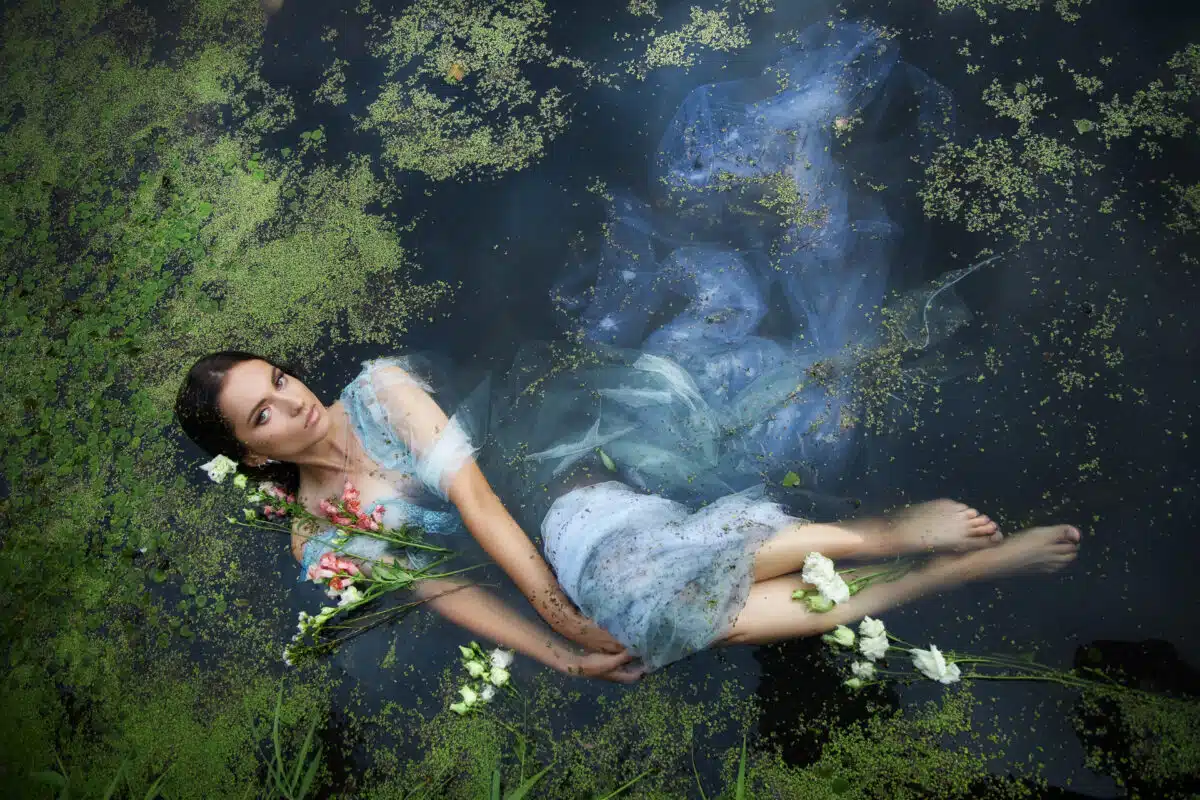
“The Hare and the Frogs.” by Jean de La Fontaine
Once in his bed deep mused the hare,
(What else but muse could he do there?)
And soon by gloom was much afflicted; –
To gloom the creature’s much addicted.
‘Alas! these constitutions nervous,’
He cried, ‘how wretchedly they serve us!
We timid people, by their action,
Can’t eat nor sleep with satisfaction;
We can’t enjoy a pleasure single,
But with some misery it must mingle.
Myself, for one, am forced by cursed fear
To sleep with open eye as well as ear.
“Correct yourself,” says some adviser.
Grows fear, by such advice, the wiser?
Indeed, I well enough descry
That men have fear, as well as I.’
With such revolving thoughts our hare
Kept watch in soul-consuming care.
A passing shade, or leaflet’s quiver
Would give his blood a boiling fever.
Full soon, his melancholy soul
Aroused from dreaming doze
By noise too slight for foes,
He scuds in haste to reach his hole.
He pass’d a pond; and from its border bogs,
Plunge after plunge, in leap’d the timid frogs,
‘Aha! I do to them, I see,’
He cried, ‘what others do to me.
The sight of even me, a hare,
Sufficeth some, I find, to scare.
And here, the terror of my tramp
Hath put to rout, it seems, a camp.
The trembling fools! they take me for
The very thunderbolt of war!
I see, the coward never skulk’d a foe
That might not scare a coward still below.’
“The Race” by A. Hoatson
Has anyone heard of the wonderful race
Of the frogs and the greyhounds, the rabbits and cats?
They rode it on bicycles, sixteen in all,
And the umpires were pugs, with cigars and high hats.
And the number of each kind of racer was four—
Four frogs dressed in green, four rabbits in brown,
Four greyhounds well brushed and with spotless shirt-fronts,
Four pussies with tails hanging gracefully down.
The four solemn puggies inspected them all
And weighed them as gravely as if they were dead.
“The rabbits must carry the dinners for all;
It’s a fair handicap, as they’re quickest,” they said.
(I’ve heard that the rabbits were angry at this;
And I think that it’s true, for they never were seen
Any more by the umpires, although the cats say
They frequently meet them at night on the green.)
And now they are ready, and “Go!” cried the first
Of the four solemn pugs as he lit his cigar.
“I shall act for the rabbits; you choose from the rest,
And carefully watch who first passes the bar.”
“The cats shall be mine,” says the fourth with a wag
Of his tightly curled tail as he sat on the grass.
“I speak for the frogs,” said the third, “for I’m sure
They’re cunning enough to let nobody pass.”
So the greyhounds are mine, then,” says pug
Number Two, And he put his blue spectacles on, and he sighed,
“I know they’ll not win, though they’ll all do their best,
For nobody ever has taught them to ride.”
The frogs came up first, with their legs straddled wide On the bicycle handles, their arms folded tight; Their umpire, the third little pug, gave a shout, And pushed his hat back in his joy at the sight.
Then up came the greyhounds, and pug Number Two,
Though dissatisfied, felt that he could not ask more.
“But where are the rabbits?” said One with a groan.
“And what has become of my pussies?” whined Four.
Well, the pussies were last, for they would not begin
With the others, but stayed to catch mice and to play;
And the rabbits rode off with the food to the woods,
So nobody got any dinner that day.
“The Hare and the Tortoise.” by Jean de La Fontaine
To win a race, the swiftness of a dart
Availeth not without a timely start.
The hare and tortoise are my witnesses.
Said tortoise to the swiftest thing that is,
‘I’ll bet that you’ll not reach, so soon as I
The tree on yonder hill we spy.’
‘So soon! Why, madam, are you frantic?’
Replied the creature, with an antic;
‘Pray take, your senses to restore,
A grain or two of hellebore.’
‘Say,’ said the tortoise, ‘what you will;
I dare you to the wager still.’
‘Twas done; the stakes were paid,
And near the goal tree laid –
Of what, is not a question for this place,
Nor who it was that judged the race.
Our hare had scarce five jumps to make,
Of such as he is wont to take,
When, starting just before their beaks
He leaves the hounds at leisure,
Thence till the kalends of the Greeks,
The sterile heath to measure.
Thus having time to browse and doze,
And list which way the zephyr blows,
He makes himself content to wait,
And let the tortoise go her gait
In solemn, senatorial state.
She starts; she moils on, modestly and lowly,
And with a prudent wisdom hastens slowly;
But he, meanwhile, the victory despises,
Thinks lightly of such prizes,
Believes it for his honour
To take late start and gain upon her.
So, feeding, sitting at his ease,
He meditates of what you please,
Till his antagonist he sees
Approach the goal; then starts,
Away like lightning darts:
But vainly does he run;
The race is by the tortoise won.
Cries she, ‘My senses do I lack?
What boots your boasted swiftness now?
You’re beat! and yet, you must allow,
I bore my house upon my back.’
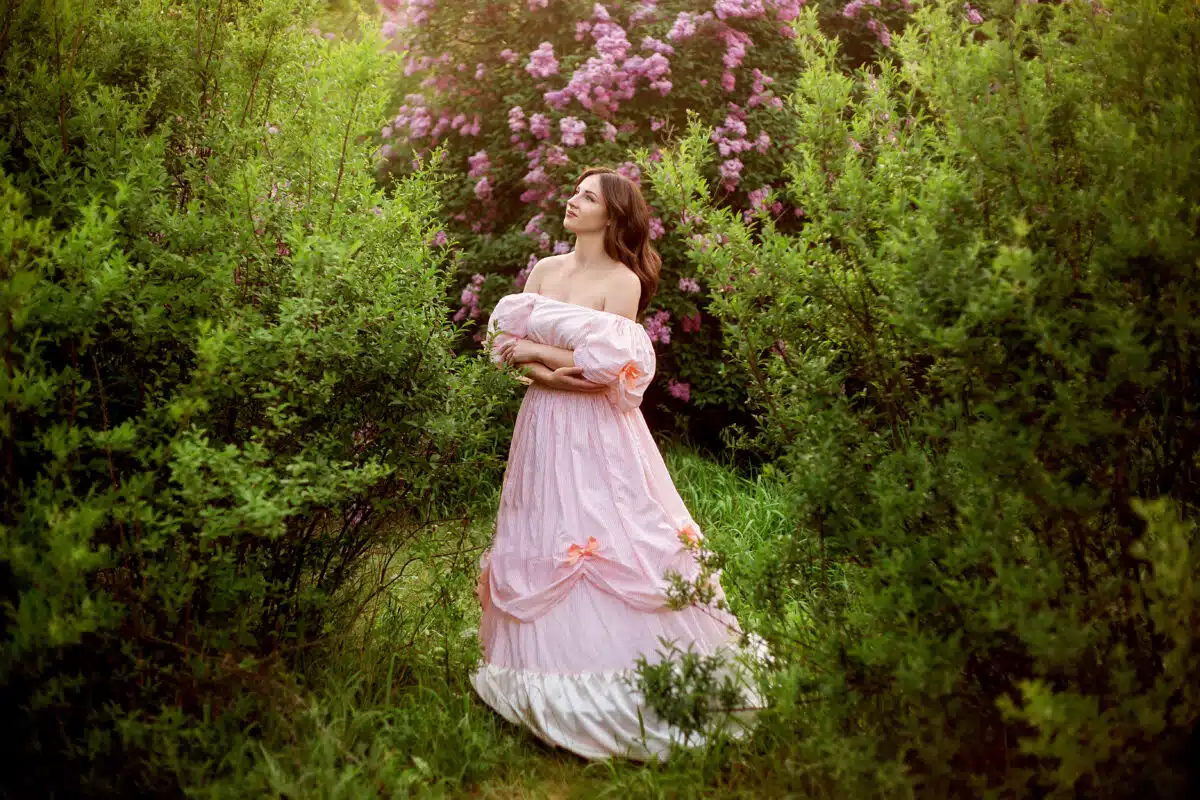
“Hare and Many Friends.” by John Gay
Friendship, as love, is but a name,
Save in a concentrated flame;
And thus, in friendships, who depend
On more than one, find not one friend.
A hare who, in a civil way,
Was not dissimilar to GAY,
Was well known never to offend,
And every creature was her friend.
As was her wont, at early dawn,
She issued to the dewy lawn;
When, from the wood and empty lair,
The cry of hounds fell on her ear.
She started at the frightful sounds,
And doubled to mislead the hounds;
Till, fainting with her beating heart,
She saw the horse, who fed apart.
“My friend, the hounds are on my track;
Oh, let me refuge on your back!”
The horse responded: “Honest Puss,
It grieves me much to see you thus.
Be comforted – relief is near;
Behold, the bull is in the rear.”
Then she implored the stately bull,
His answer we relate in full:
“Madam, each beast alive can tell
How very much I wish you well;
But business presses in a heap,
I an appointment have to keep;
And now a lady’s in the case, –
When other things, you know, give place.
Behold the goat is just behind;
Trust, trust you’ll not think me unkind.”
The goat declared his rocky lairs
Wholly unsuited were to hares.
“There is the sheep,” he said, “with fleece.
Adapted, now, to your release.”
The sheep replied that she was sure
Her weight was too great to endure;
“Besides,” she said, “hounds worry sheep.”
Next was a calf, safe in a keep:
“Oh, help me, bull-calf – lend me aid!”
“My youth and inexperience weighed,”
Replied the bull-calf, “though I rue it,
Make me incompetent to do it;
My friends might take offence. My heart –
You know my heart, my friend – we part,
I do assure you – – Hark! adieu!
The pack, in full cry, is in view.”
“The Persevering Tortoise and the Pretentious Hare” by Guy Wetmore Carryl
Once a turtle, finding plenty
In seclusion to bewitch,
Lived a dolce far niente
Kind of life within a ditch;
Rivers had no charm for him,
As he told his wife and daughter,
“Though my friends are in the swim,
Mud is thicker far than water.”
One fine day, as was his habit,
He was dozing in the sun,
When a young and flippant rabbit
Happened by the ditch to run:
“Come and race me,” he exclaimed,
“Fat inhabitant of puddles.
Sluggard! You should be ashamed.
Such a life the brain befuddles.”
This, of course, was banter merely,
But it stirred the torpid blood
Of the turtle, and severely
Forth he issued from the mud.
“Done!” he cried. The race began,
But the hare resumed his banter,
Seeing how his rival ran
In a most unlovely canter.
Shouting, “Terrapin, you’re bested!
You’d be wiser, dear old chap,
If you sat you down and rested
When you reach the second lap.”
Quoth the turtle, “I refuse.
As for you, with all your talking,
Sit on any lap you choose.
I shall simply go on walking.”
Now this sporting proposition
Was, upon its face, absurd;
Yet the hare, with expedition,
Took the tortoise at his word,
Ran until the final lap,
Then, supposing he’d outclassed him,
Laid him down and took a nap
And the patient turtle passed him!
Plodding on, he shortly made the
Line that marked the victor’s goal;
Paused, and found he’d won, and laid the
Flattering unction to his soul.
Then in fashion grandiose,
Like an after-dinner speaker,
Touched his flipper to his nose,
And remarked, “Ahem! Eureka!”
And THE MORAL (lest you miss one)
Is: There’s often time to spare,
And that races are (like this one)
Won not always by a hair.
“Ballad for Bishops” by Alfred Bruce Douglas
Bishops and others who inhabit
The mansions of the blest on earth,
Grieved by decline of infant birth,
Have drawn attention to the rabbit.
Not by design these good men work
To raise that beast to heights contested,
But by comparison, suggested,
With those who procreation shirk.
For if a nation’s moral status
Be measured by prolific habit,
Between man and the meanest rabbit
There is an evident hiatus.
Each year, by lowest computations,
Six times the rabbit rears her young,
And frequent marriages among
The very closest blood relations
In very tender years ensure
A constant stream of “little strangers,”
Who, quickly grown to gallant rangers,
See that their families endure.
Not theirs to shirk paternal cares,
Moved by considerations sordid,
A child can always “be afforded”;
The same applies to Belgian hares.
These noble brutes, pure Duty’s pendants,
May live to see their blood vermilion
Coursing through something like a billion
Wholly legitimate descendants.
Knowledge’s path is hard and stony,
And some may read who unaware are
That rabbit brown and Belgian hare are
Both members of the genus Coney.
The common hare, who lives in fields
And never goes into a hole,
(In this inferior to the mole)
In all things to the Belgian yields.
He will, immoral brute, decline
To multiply domestic “pledges,”
The family he rears in hedges
Is often limited to nine.
Such shocking want of savoir faire,
(Surely a symptom of insanity)
Might goad a Bishop to profanity
Were it not for the Belgian hare.
Funny Poems About Rabbits

“Nonsense Rhymes” by Edward Lear
There was an Old Person whose habits
Induced him to feed upon Rabbits;
When he’d eaten eighteen, he turned perfectly green,
Upon which he relinquished those habits.
“The Hare and the Tortoise.” by Jean de La Fontaine
Said the Tortoise one day to the Hare:
“I’ll run you a race if you dare.
I’ll bet you cannot
Arrive at that spot
As quickly as I can get there.”
Quoth the Hare: “You are surely insane.
Pray, what has affected your brain?
You seem pretty sick.
Call a doctor in – quick,
And let him prescribe for your pain.”
“Never mind,” said the Tortoise. “Let’s run!
Will you bet me?” “Why, certainly.” “Done!”
While the slow Tortoise creeps
Mr. Hare makes four leaps,
And then loafs around in the sun.
It seemed such a one-sided race,
To win was almost a disgrace.
So he frolicked about
Then at last he set out –
As the Tortoise was as nearing the place.
Too late! Though he sped like a dart,
The Tortoise was first. She was smart:
“You can surely run fast,”
She remarked. “Yet you’re last.
It is better to get a good start.”
“R” by Edward Lear
R was a rabbit,
Who had a bad habit
Of eating the flowers
In gardens and bowers.
Naughty fat rabbit!

“An Arctic Hare.” by Oliver Herford
An Arc-tic Hare we now be-hold.
The hair, you will ob-serve, is white;
But if you think the Hare is old,
You will be ver-y far from right.
The Hare is young, and yet the hair
Grew white in but a sin-gle night.
Why, then it must have been a scare
That turned this Hare. No; ‘t was not fright
(Al-though such cases are well known);
I fear that once a-gain you’re wrong.
Know then, that in the Arc-tic Zone
A sin-gle night is six months long.
“Nonsense Rhymes” by Edward Lear
There was an old man whose despair
Induced him to purchase a hare:
Whereon one fine day he rode wholly away,
Which partly assuaged his despair.
“The Hare” by Walter De La Mare
In the black furrow of a field
I saw an old witch-hare this night;
And she cocked a lissome ear,
And she eyed the moon so bright,
And she nibbled of the green;
And I whispered “Wh-s-st! witch-hare,”
Away like a ghostie o’er the field She fled,
and left the moonlight there.
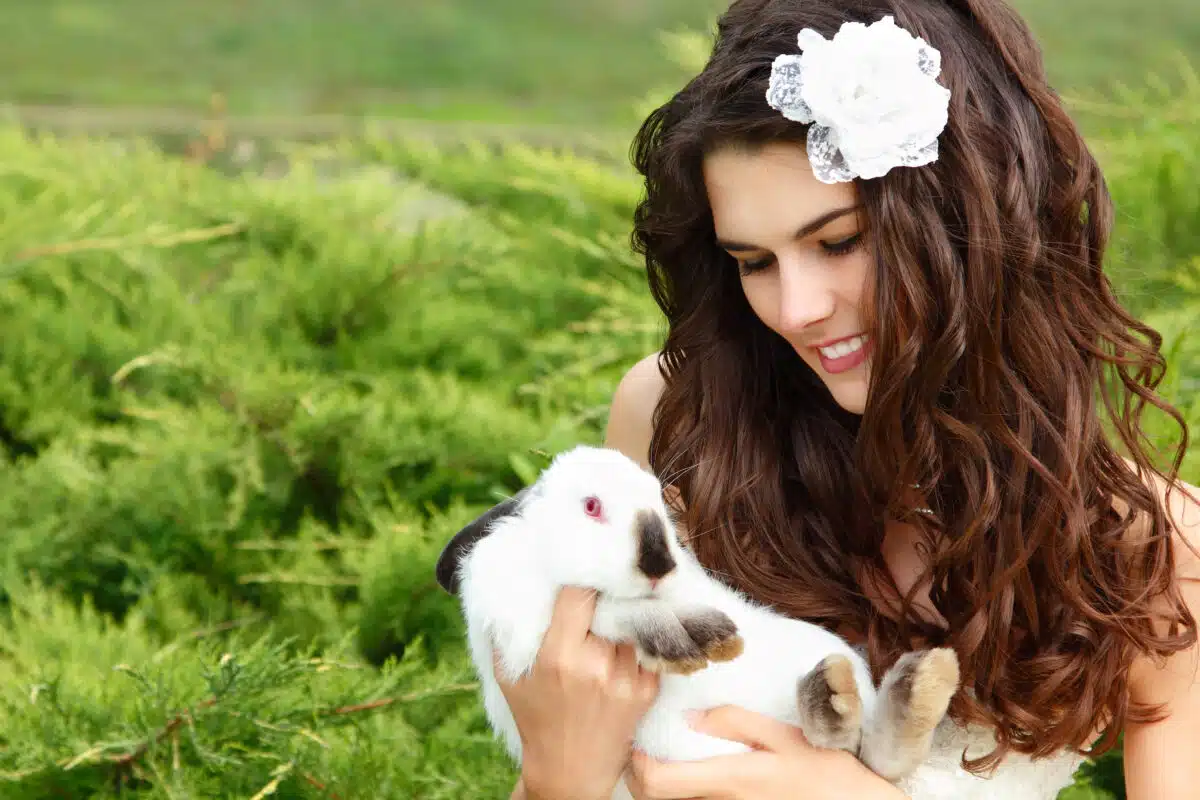
“Jack the Rabbit” by David Starr Jordan
Jack the Rabbit
Has the habit
When you look him in the face
He is in some other place.
Poems About Rabbits With Rhyme
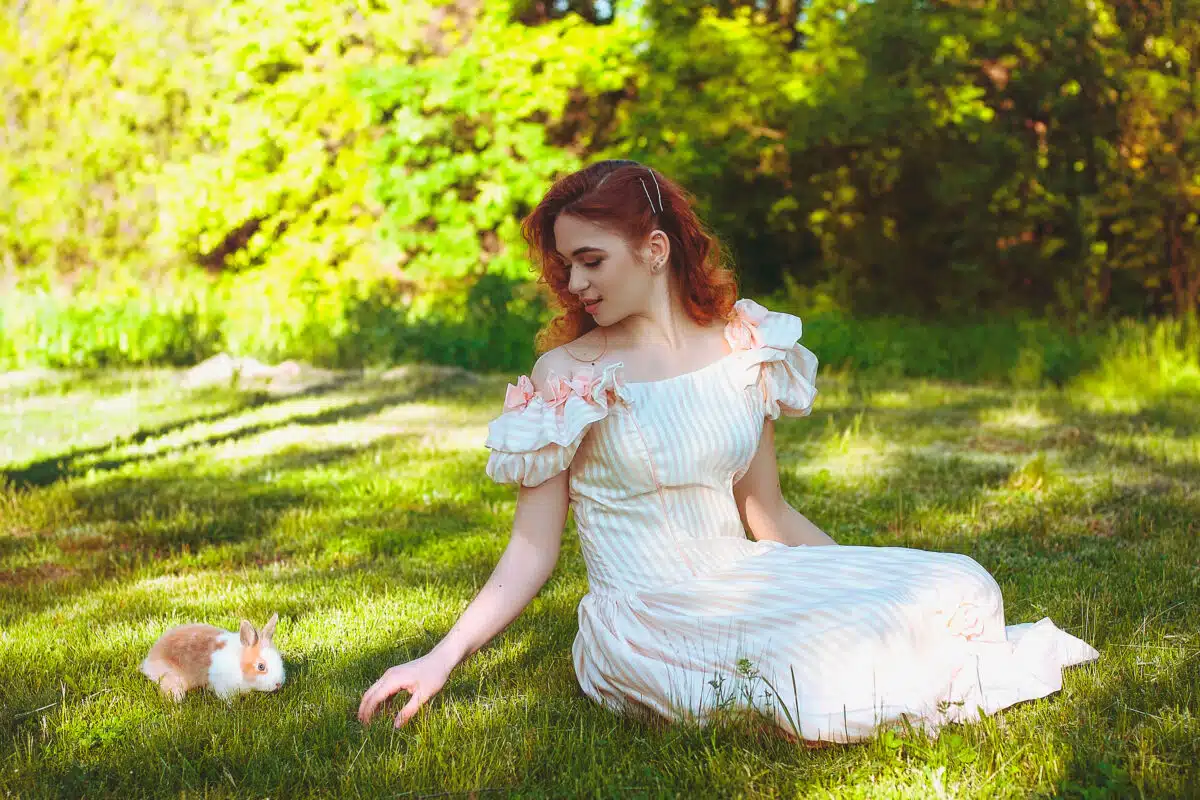
“Battle Bunny” by Bret Harte
Bunny, lying in the grass,
Saw the shining column pass;
Saw the starry banner fly,
Saw the chargers fret and fume,
Saw the flapping hat and plume,–
Saw them with his moist and shy
Most unspeculative eye,
Thinking only, in the dew,
That it was a fine review.
Till a flash, not all of steel,
Where the rolling caissons wheel,
Brought a rumble and a roar
Rolling down that velvet floor,
And like blows of autumn flail
Sharply threshed the iron hail.
Bunny, thrilled by unknown fears,
Raised his soft and pointed ears,
Mumbled his prehensile lip,
Quivered his pulsating hip,
As the sharp vindictive yell
Rose above the screaming shell;
Thought the world and all its men,–
All the charging squadrons meant,–
All were rabbit-hunters then,
All to capture him intent.
Bunny was not much to blame:
Wiser folk have thought the same,–
Wiser folk who think they spy
Every ill begins with “I.”
Wildly panting here and there,
Bunny sought the freer air,
Till he hopped below the hill,
And saw, lying close and still,
Men with muskets in their hands.
(Never Bunny understands
That hypocrisy of sleep,
In the vigils grim they keep,
As recumbent on that spot
They elude the level shot.)
One–a grave and quiet man,
Thinking of his wife and child
Far beyond the Rapidan,
Where the Androscoggin smiled–
Felt the little rabbit creep,
Nestling by his arm and side,
Wakened from strategic sleep,
To that soft appeal replied,
Drew him to his blackened breast,
And– But you have guessed the rest.
Softly o`er that chosen pair
Omnipresent Love and Care
Drew a mightier Hand and Arm,
Shielding them from every harm;
Right and left the bullets waved,
Saved the saviour for the saved.
Who believes that equal grace
God extends in every place,
Little difference he scans
Twixt a rabbit`s God and man’s.
“The Hare and the Partridge.” by Jean de La Fontaine
A field in common share
A partridge and a hare,
And live in peaceful state,
Till, woeful to relate!
The hunters’ mingled cry
Compels the hare to fly.
He hurries to his fort,
And spoils almost the sport
By faulting every hound
That yelps upon the ground.
At last his reeking heat
Betrays his snug retreat.
Old Tray, with philosophic nose,
Snuffs carefully, and grows
So certain, that he cries,
“The hare is here; bow wow!”
And veteran Ranger now,–
The dog that never lies,–
“The hare is gone,” replies.
Alas! poor, wretched hare,
Back comes he to his lair,
To meet destruction there!
The partridge, void of fear,
Begins her friend to jeer:–
“You bragg’d of being fleet;
How serve you, now, your feet?”
Scarce has she ceased to speak,–
The laugh yet in her beak,–
When comes her turn to die,
From which she could not fly.
She thought her wings, indeed,
Enough for every need;
But in her laugh and talk,
Forgot the cruel hawk!
“Conclusion (Ballad of the Lost Hare)” by Margaret Sidney
Had ever a beast such mad career?
Such a hare-brained race,
Such a long, long chase,
As this silly little Hare recorded here?
This Hare, who wouldn’t stop to fight,
Who ran away both day and night
Who put himself delightedly
Among the best of company,
Who acting soon a reckless part,
Then posted off with all his heart;
Forever he’s compelled to roam,
He never can enjoy a home.
Hark! do you think that’s rustling wind?
Oh no, its nothing of the kind;
It’s this poor, homeless, restless
Hare Rushing here, there, and everywhere.
List! do you hear the rain-drops fall
In gentle shower from tree-top tall?
Oh me!
Oh my!
It’s poor Hare pattering by.
By the light of the silver moon—moon—moon,
He runs to the rhythm of a dismal tune;
In the gay merry shine of a summer day,
He still is running, away—away.
In cold, in heat, in rain, in snow,
This poor little creature must go—must go;
Perhaps if you’re there in time you’ll see
This wandering Hare,
This miserable Hare,
Rush over the hill-top, bleak and bare.
Do you suppose he wishes his home to see,
His sisters two, and his brothers three?
Would he like to lie down in his own little bed?
And does he recall what his father said?
And long for his mother to tuck him up tight,
Just as she used to, every night?
Who can say
As alway He goes on—and on—and on—and on——
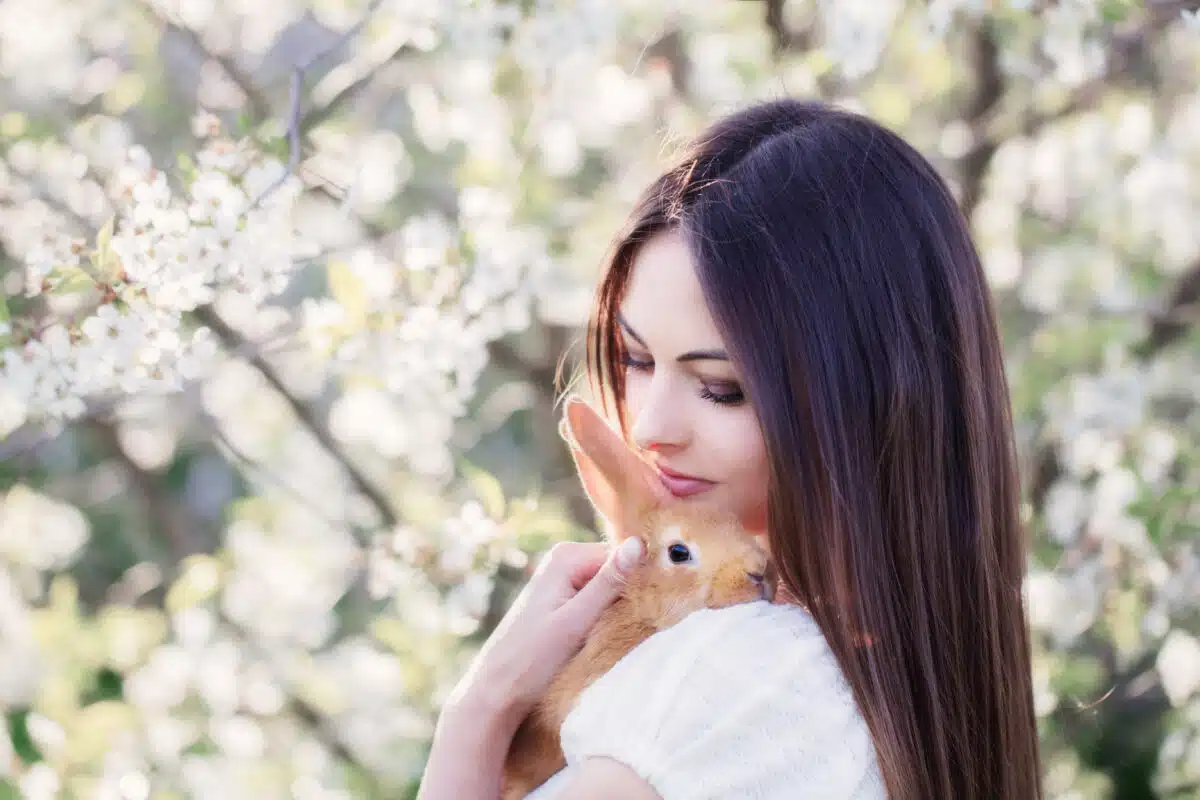
“Lines, on Startling a Rabbit.” by John Hartley
Whew! – Tha’rt in a famous hurry!
Awm nooan baan to try to catch thi!
Aw’ve noa dogs wi’ me to worry
Thee poor thing, – aw like to watch thi.
Tha’rt a runner! aw dar back thi,
Why, tha ommost seems to fly!
Did ta think aw meant to tak thi?
Well, awm fond o’ rabbit pie.
Aw dooan’t want th’ world to misen, mun,
Awm nooan like a dog i’th’ manger;
Yet still ‘twor happen best to run,
For tha’rt th’ safest aght o’ danger.
An sometimes fowks’ inclination
Leads ’em to do what they shouldn’t; –
But tha’s saved me a temptation, –
Aw’ve net harmed thi, ‘coss aw couldn’t.
Aw wish all temptations fled me,
As tha’s fled throo me to-day;
For they’ve oft to trouble led me,
For which aw’ve had dear to pay.
An a taicher wise aw’ve faand thi,
An this lesson gained throo thee;
‘At when dangers gether raand me,
Th’ wisest tactics is to flee.
They may call thi coward, Bunny,
But if mine had been thy lot,
Aw should fail to see owt funny,
To be stewin in a pot.
Life to thee, awm sewer is sweeter,
Nor thi flesh to me could prove;
May thy lot an mine grow breeter,
Blest wi’ liberty an love.
“The Rabbits.” by Jean de La Fontaine
While watching man in all his phases,
And seeing that, in many cases,
He acts just like the brute creation, –
I’ve thought the lord of all these races
Of no less failings show’d the traces
Than do his lieges in relation;
And that, in making it, Dame Nature
Hath put a spice in every creature
From off the self-same spirit-stuff –
Not from the immaterial,
But what we call ethereal,
Refined from matter rough.
An illustration please to hear.
Just on the still frontier
Of either day or night, –
Or when the lord of light
Reclines his radiant head
Upon his watery bed,
Or when he dons the gear,
To drive a new career, –
While yet with doubtful sway
The hour is ruled ‘twixt night and day, –
Some border forest-tree I climb;
And, acting Jove, from height sublime
My fatal bolt at will directing,
I kill some rabbit unsuspecting.
The rest that frolick’d on the heath,
Or browsed the thyme with dainty teeth,
With open eye and watchful ear,
Behold, all scampering from beneath,
Instinct with mortal fear.
All, frighten’d simply by the sound,
Hie to their city underground.
But soon the danger is forgot,
And just as soon the fear lives not:
The rabbits, gayer than before,
I see beneath my hand once more!
Are not mankind well pictured here?
By storms asunder driven,
They scarcely reach their haven,
And cast their anchor, ere
They tempt the same dread shocks
Of tempests, waves, and rocks.
True rabbits, back they frisk
To meet the self-same risk!
I add another common case.
When dogs pass through a place
Beyond their customary bounds,
And meet with others, curs or hounds,
Imagine what a holiday!
The native dogs, whose interests centre
In one great organ, term’d the venter,
The strangers rush at, bite, and bay;
With cynic pertness tease and worry,
And chase them off their territory.
So, too, do men. Wealth, grandeur, glory,
To men of office or profession,
Of every sort, in every nation,
As tempting are, and sweet,
As is to dogs the refuse meat.
With us, it is a general fact,
One sees the latest-come attack’d,
And plunder’d to the skin.
Coquettes and authors we may view,
As samples of the sin;
For woe to belle or writer new!
The fewer eaters round the cake,
The fewer players for the stake,
The surer each one’s self to take.
A hundred facts my truth might test;
But shortest works are always best.
In this I but pursue the chart
Laid down by masters of the art;
And, on the best of themes, I hold,
The truth should never all be told.
Hence, here my sermon ought to close.
O thou, to whom my fable owes
Whate’er it has of solid worth, –
Who, great by modesty as well as birth,
Hast ever counted praise a pain, –
Whose leave I could so ill obtain
That here your name, receiving homage,
Should save from every sort of damage
My slender works – which name, well known
To nations, and to ancient Time,
All France delights to own;
Herself more rich in names sublime
Than any other earthly clime; –
Permit me here the world to teach
That you have given my simple rhyme
The text from which it dares to preach.
“The Graveyard Rabbit” by Frank LebbyStanton
In the white moonlight, where the willow waves,
He halfway gallops among the graves—
A tiny ghost in the gloom and gleam,
Content to dwell where the dead men dream,
But wary still!
For they plot him ill;
For the graveyard rabbit hath a charm
(May God defend us!) to shield from harm.
Over the shimmering slabs he goes—
Every grave in the dark he knows;
But his nest is hidden from human eye
Where headstones broken on old graves lie.
Wary still!
For they plot him ill;
For the graveyard rabbit, though sceptics scoff,
Charmeth the witch and the wizard off!
The black man creeps, when the night is dim,
Fearful, still, on the track of him;
Or fleetly follows the way he runs,
For he heals the hurts of the conjured ones.
Wary still!
For they plot him ill;
The soul’s bewitched that would find release,—
To the graveyard rabbit go for peace!
He holds their secret—he brings a boon
Where winds moan wild in the dark o’ the moon;
And gold shall glitter and love smile sweet
To whoever shall sever his furry feet!
Wary still!
For they plot him ill;
For the graveyard rabbit hath a charm
(May God defend us!) to shield from harm.
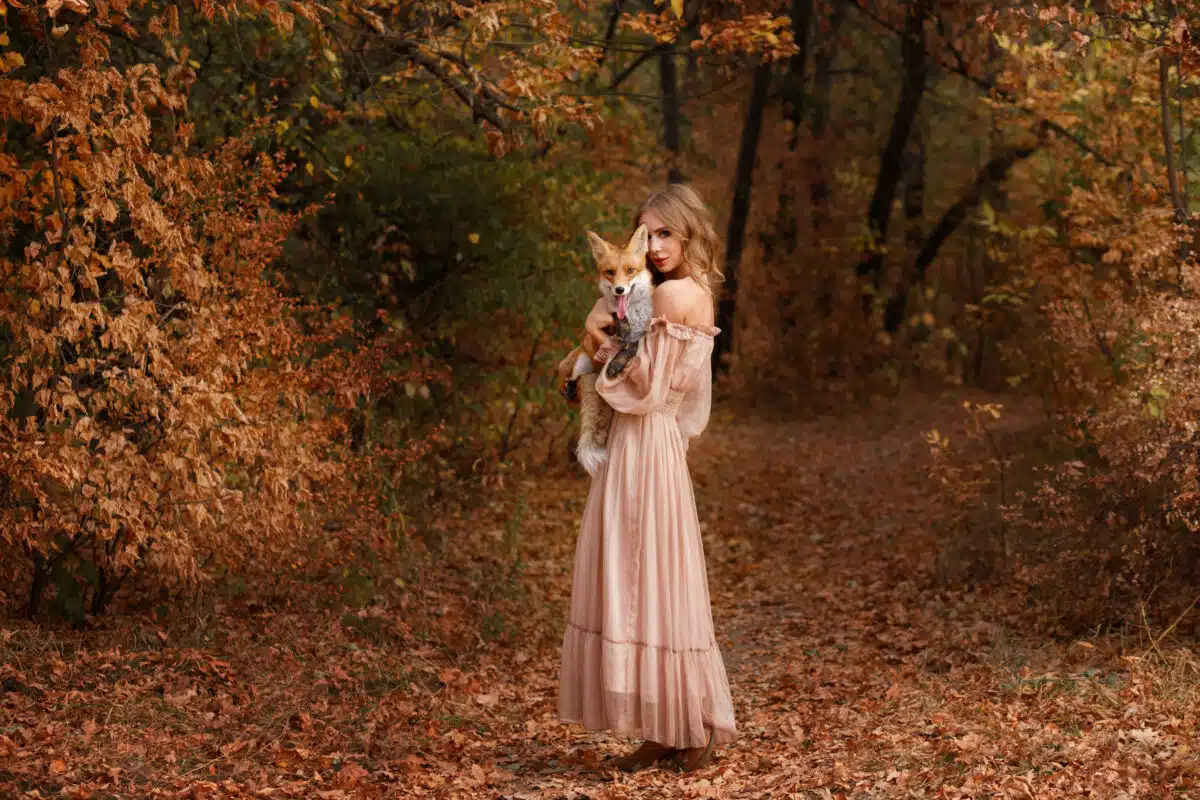
“The Hare and the Fox” by Bjørnstjerne Martinius Bjørnson (Arthur Palmer, Translator)
The fox lay still by the birch-tree’s root
In the heather.
The hare was running with nimble foot
O’er the heather.
Was ever brighter a sunshine-day,
Before, behind me, and every way,
O’er the heather!
The fox laughed low by the birch-tree’s root
In the heather.
The hare was running with daring foot
O’er the heather.
I am so happy for everything!
Hallo! Why go you with mighty spring
O’er the heather?
The fox lay hid by the birch-tree’s root
In the heather.
The hare dashed to him with reckless foot
O’er the heather.
May God have mercy, but this is queer! –
Good gracious, how dare you dance so here
O’er the heather?
“The Ears of the Hare.” by Jean de La Fontaine
Some beast with horns did gore
The lion; and that sovereign dread,
Resolved to suffer so no more,
Straight banish’d from his realm, ’tis said,
All sorts of beasts with horns –
Rams, bulls, goats, stags, and unicorns.
Such brutes all promptly fled.
A hare, the shadow of his ears perceiving,
Could hardly help believing
That some vile spy for horns would take them,
And food for accusation make them.
‘Adieu,’ said he, ‘my neighbour cricket;
I take my foreign ticket.
My ears, should I stay here,
Will turn to horns, I fear;
And were they shorter than a bird’s,
I fear the effect of words.’
‘These horns!’ the cricket answer’d; ‘why,
God made them ears who can deny?’
‘Yes,’ said the coward, ‘still they’ll make them horns,
And horns, perhaps of unicorns!
In vain shall I protest,
With all the learning of the schools:
My reasons they will send to rest
In th’ Hospital of Fools.’
Poems for a Rabbit That Died
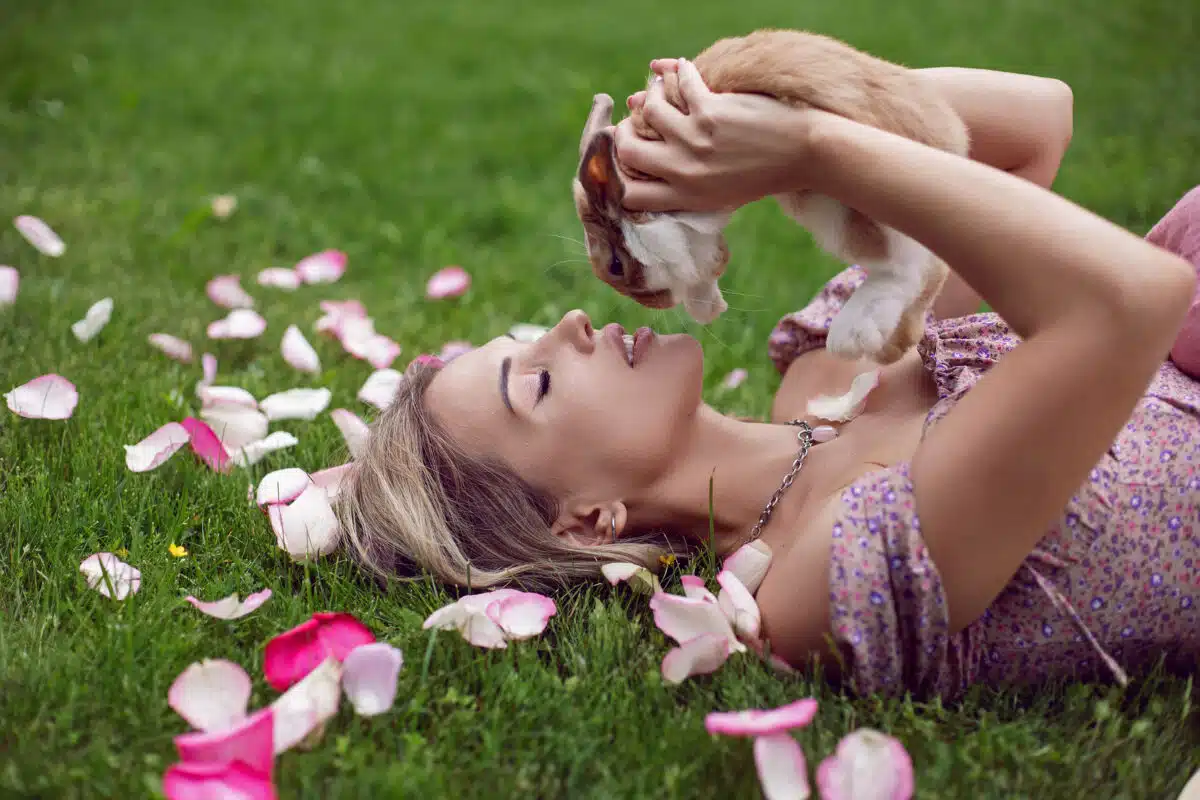
“On Seeing a Wounded Hare Limp by Me, Which a Fellow Had Just Shot.” by Robert Burns
Inhuman man! curse on thy barb’rous art,
And blasted be thy murder-aiming eye;
May never pity soothe thee with a sigh,
Nor ever pleasure glad thy cruel heart.
Go live, poor wanderer of the wood and field!
The bitter little that of life remains:
No more the thickening brakes and verdant plains
To thee shall home, or food, or pastime yield.
Seek, mangled wretch, some place of wonted rest,
No more of rest, but now thy dying bed!
The sheltering rushes whistling o’er thy head,
The cold earth with thy bloody bosom prest.
Oft as by winding Nith, I, musing, wait
The sober eve, or hail the cheerful dawn;
I’ll miss thee sporting o’er the dewy lawn,
And curse the ruffian’s aim, and mourn thy hapless fate.
“The Eagle and the Beetle.” by Jean de La Fontaine
John Rabbit, by Dame Eagle chased,
Was making for his hole in haste,
When, on his way, he met a beetle’s burrow.
I leave you all to think
If such a little chink
Could to a rabbit give protection thorough.
But, since no better could be got,
John Rabbit there was fain to squat.
Of course, in an asylum so absurd,
John felt ere long the talons of the bird.
But first, the beetle, interceding, cried,
‘Great queen of birds, it cannot be denied,
That, maugre my protection, you can bear
My trembling guest, John Rabbit, through the air.
But do not give me such affront, I pray;
And since he craves your grace,
In pity of his case,
Grant him his life, or take us both away;
For he’s my gossip, friend, and neighbour.’
In vain the beetle’s friendly labour;
The eagle clutch’d her prey without reply,
And as she flapp’d her vasty wings to fly,
Struck down our orator and still’d him;
The wonder is she hadn’t kill’d him.
The beetle soon, of sweet revenge in quest,
Flew to the old, gnarl’d mountain oak,
Which proudly bore that haughty eagle’s nest.
And while the bird was gone,
Her eggs, her cherish’d eggs, he broke,
Not sparing one.
Returning from her flight, the eagle’s cry,
Of rage and bitter anguish, fill’d the sky.
But, by excess of passion blind,
Her enemy she fail’d to find.
Her wrath in vain, that year it was her fate
To live a mourning mother, desolate.
The next, she built a loftier nest; ’twas vain;
The beetle found and dash’d her eggs again.
John Rabbit’s death was thus revenged anew.
The second mourning for her murder’d brood
Was such, that through the giant mountain wood,
For six long months, the sleepless echo flew.
The bird, once Ganymede, now made
Her prayer to Jupiter for aid;
And, laying them within his godship’s lap,
She thought her eggs now safe from all mishap;
The god his own could not but make them –
No wretch, would venture there to break them.
And no one did. Their enemy, this time,
Upsoaring to a place sublime,
Let fall upon his royal robes some dirt,
Which Jove just shaking, with a sudden flirt,
Threw out the eggs, no one knows whither.
When Jupiter inform’d her how th’ event
Occurr’d by purest accident,
The eagle raved; there was no reasoning with her;
She gave out threats of leaving court,
To make the desert her resort,
And other brav’ries of this sort.
Poor Jupiter in silence heard
The uproar of his favourite bird.
Before his throne the beetle now appear’d,
And by a clear complaint the mystery clear’d.
The god pronounced the eagle in the wrong.
But still, their hatred was so old and strong,
These enemies could not be reconciled;
And, that the general peace might not be spoil’d, –
The best that he could do, – the god arranged,
That thence the eagle’s pairing should be changed,
To come when beetle folks are only found
Conceal’d and dormant under ground.
“A Man Young and Old:- The Death of the Hare” by William Butler Yeats
I have pointed out the yelling pack,
The hare leap to the wood,
And when I pass a compliment
Rejoice as lover should
At the drooping of an eye,
At the mantling of the blood.
Then suddenly my heart is wrung
By her distracted air
And I remember wildness lost
And after, swept from there,
Am set down standing in the wood
At the death of the hare.

“Epitaph on a Hare.” by William Cowper
Here lies, whom hound did ne’er pursue,
Nor swifter greyhound follow,
Whose foot ne’er tainted morning dew,
Nor ear heard huntsman’s halloo;
Old Tiney, surliest of his kind,
Who, nursed with tender care,
And to domestic bounds confined,
Was still a wild Jack hare.
Though duly from my hand he took
His pittance every night,
He did it with a jealous look,
And, when he could, would bite.
His diet was of wheaten bread
And milk, and oats, and straw;
Thistles, or lettuces instead,
With sand to scour his maw.
On twigs of hawthorn he regaled,
On pippins’ russet peel,
And, when his juicy salads fail’d,
Sliced carrot pleased him well
A Turkey carpet was his lawn,
Whereon he loved to bound,
To skip and gamble like a fawn,
And swing his rump around.
His frisking was at evening hours,
For then he lost his fear,
But most before approaching showers,
Or when a storm drew near.
Eight years and five round rolling moons
He thus saw steal away,
Dozing out all his idle noons,
And every night at play.
I kept him for his humour’s sake,
For he would oft beguile
My heart of thoughts that made it ache,
And force me to a smile.
But now beneath this walnut shade
He finds his long last home,
And waits, in snug concealment laid,
Till gentler Puss shall come.
He, still more aged, feels the shocks,
From which no care can save,
And, partner once of Tiney’s box,
Must soon partake his grave.
